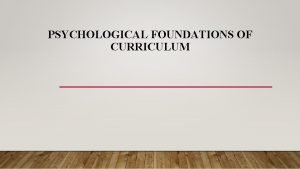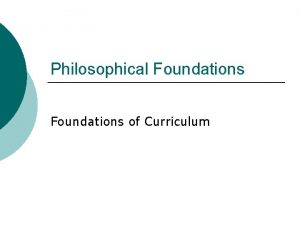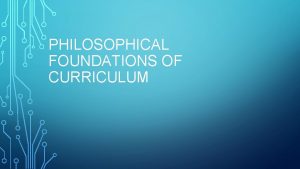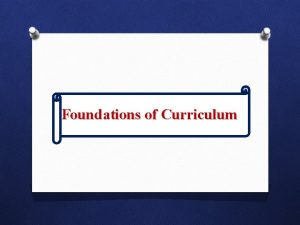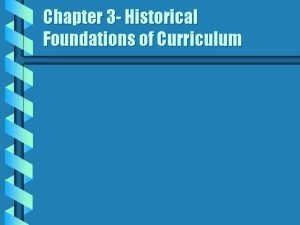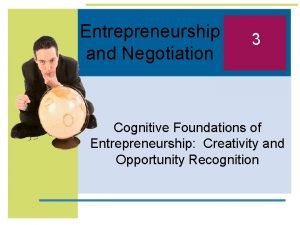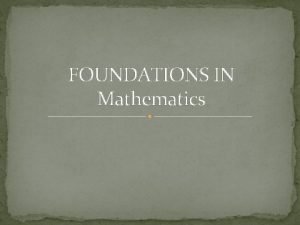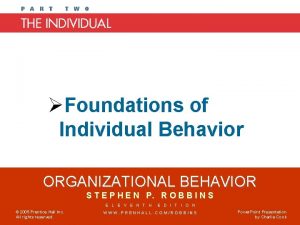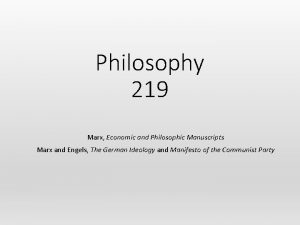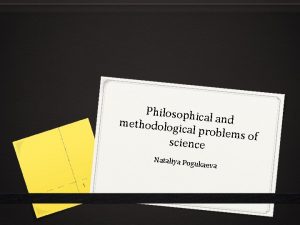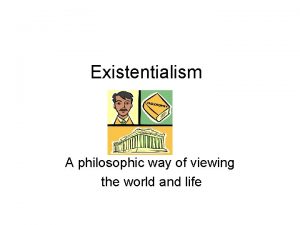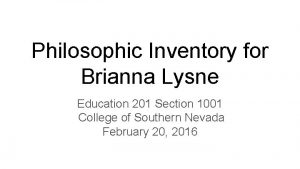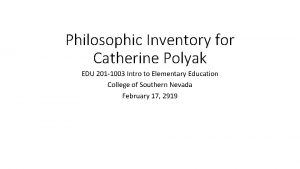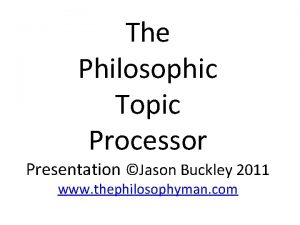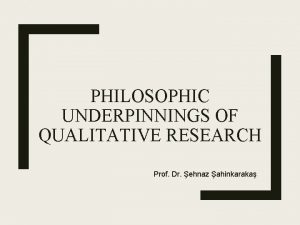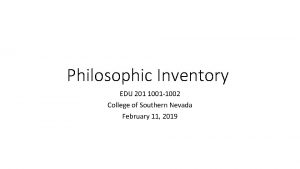Foundations of Curriculum Foundations of Curriculum Philosophic al














- Slides: 14

Foundations of Curriculum

Foundations of Curriculum Philosophic al Foundations of Curriculum Sociological Psychologic al

Philosophical Foundation of Curriculum • Philosophy is considered as one of the major foundations of curriculum since the selection of the curriculum topics and activities depends upon the beliefs of the curriculum planner, which depends upon his philosophy of education. • Formulation of educational goals which determine the curriculum are determined on the basis of the philosophy.

• Philosophy provides the following information for curriculum planning: 1. What are beliefs about the nature of people? 2. What are the sources of truth and values that 3. 4. 5. 6. provide life? What constitute a good life? What should be learnt by the people? What role should be played by the school in the society? What role should be played by the teacher in the learning process?

The main philosophies of Education Philosophies of Education Idealism Realism Pragmatis m Existentialis m

Idealism • Plato advocated the philosophy of idealism. • It believes that children are born good. • The school and teachers should help them strengthen their inner goodness and religious and moral values. • Learning should be centered around broad ideas.

Realism • Aristotle developed the philosophy of realism. • According to realism, children are born ignorant. • Children should be provided by proper guidance and real virtues to learn. • The education should be preparation for a good life.

Pragmatism • John Dewey was the proponent of pragmatism. • According to pragmatism, children had the physical and mental equipment to participate in the world. • Children learn through interaction. • Truths and values are not fixed as they were the result of changing human experience.

Existentialism • Jean-Paul Sartre and Masten Buber developed the philosophy of existentialism. • They believe that life was without any order and that values can be developed differently by different people in different situations. • Child is an individual and should acquire or create his own ideas. • Nature of education should be determined by the child himself.

Sociological Foundations of Curriculum • It is necessary for learners to identify the social issues they will face which are affected by two factors: 1. students not only live in the larger world outside the school but they learn a great deal from this world. 2. the role of the school is important in meeting the needs of the society.

• The curriculum planner should take into consideration the following issues: What knowledge, skills and attitudes do the society need in students of today and adults of tomorrow? 2. Is curriculum for maintaining the present values of society? 3. Should the curriculum bring out changes in values of society? 4. Should specific social problems be included in the curriculum? 1.

The social issues that should be considered while framing the curriculum A. Family Structure B. Occupational Structure C. Change in role of women D. Communalism E. Values

Psychological Foundations of Curriculum • Psychology has made great contribution for the development of school curriculum through researches in motivation, learning, child growth and development ….

Psychological Foundations of Curriculum 1. Self-Actualization 2. Development Tasks 3. Fully Functional Personality 4. Needs Theory
 What are the five psychological foundations of curriculum
What are the five psychological foundations of curriculum Curriculum trends in idealism
Curriculum trends in idealism Philosophical foundations of curriculum
Philosophical foundations of curriculum What are the 3 foundations of curriculum?
What are the 3 foundations of curriculum? Historical foundations of curriculum
Historical foundations of curriculum Lotus bunkering
Lotus bunkering Multinational financial management definition
Multinational financial management definition Cognitive foundations of entrepreneurship
Cognitive foundations of entrepreneurship Preschool learning foundations math
Preschool learning foundations math Unit 1 foundations of american government
Unit 1 foundations of american government Six sigma foundations
Six sigma foundations Preschool foundations volume 1
Preschool foundations volume 1 Aohs foundations of anatomy and physiology 1
Aohs foundations of anatomy and physiology 1 Financial foundations for thriving communities
Financial foundations for thriving communities Foundations of individual behavior
Foundations of individual behavior
